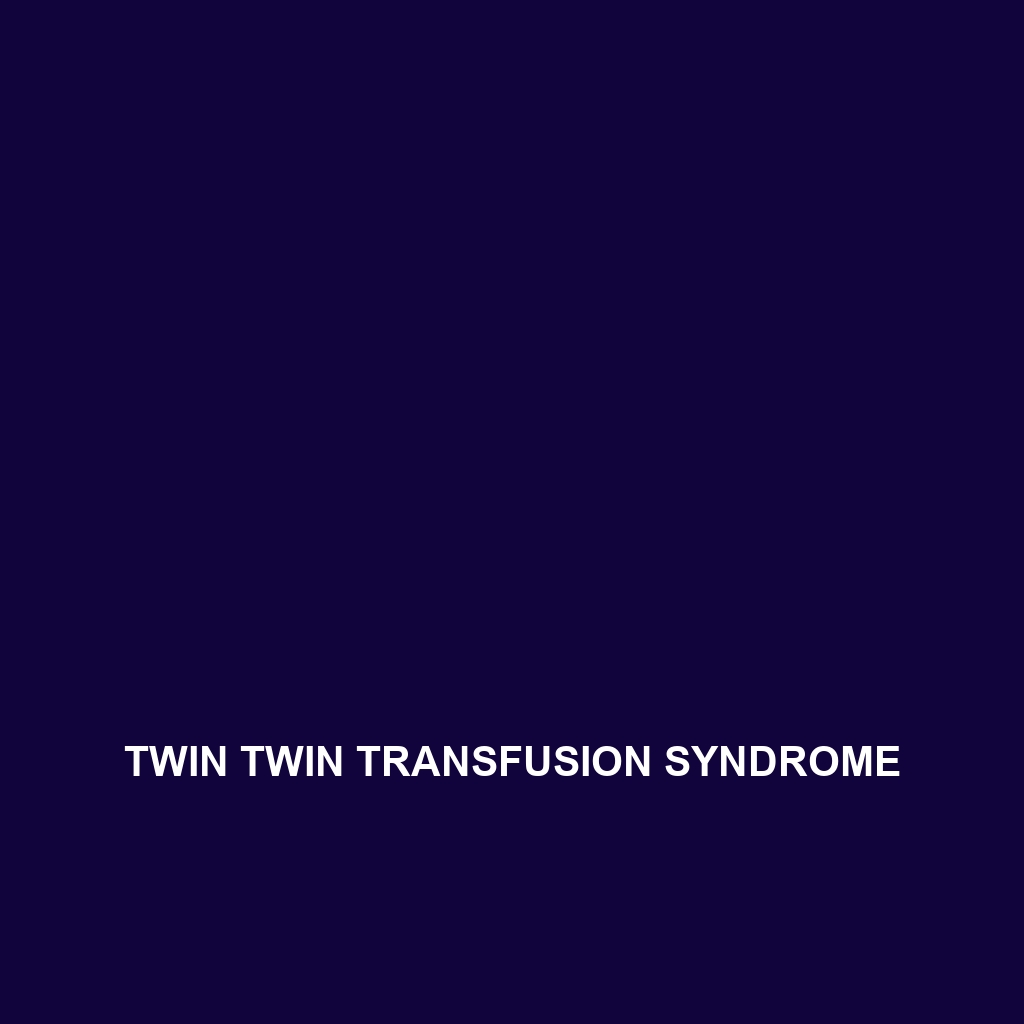Twin Twin Transfusion Syndrome:
Definition and Description of Twin Twin Transfusion Syndrome:
Twin Twin Transfusion Syndrome (TTTS) is a serious condition that can occur in pregnancies involving identical twins who share a placenta. It is characterized by an unequal distribution of blood flow between the twins, leading to one twin receiving too much blood (the recipient) while the other receives too little (the donor). This imbalance can result in a host of complications for both twins, including heart failure in the recipient twin and growth restriction in the donor twin. TTTS is most commonly diagnosed via ultrasound imaging and requires careful monitoring due to its potential severity.
Causes of Twin Twin Transfusion Syndrome:
The primary cause of Twin Twin Transfusion Syndrome is the presence of placental vascular anastomoses—connections between the blood vessels of the twins’ shared placenta. These connections can lead to an uneven distribution of blood and nutrients. Factors such as abnormalities in the placenta, genetic predispositions, and certain maternal health conditions can contribute to the development of TTTS. The syndrome typically occurs in monochorionic-diamniotic (MCDA) twins, where twins share a single amniotic sac and placenta.
Associated Symptoms of Twin Twin Transfusion Syndrome:
The symptoms of Twin Twin Transfusion Syndrome may vary depending on the severity of the condition. Common signs include:
– Discrepancy in fetal size, with one twin appearing larger than the other
– Increased amniotic fluid around the recipient twin, which may lead to polyhydramnios (excess amniotic fluid)
– Decreased amniotic fluid around the donor twin, known as oligohydramnios
– Heart failure symptoms in the recipient twin, such as swelling or excessive fluid accumulation
– Growth restriction noted during ultrasounds.
Diagnosis of Twin Twin Transfusion Syndrome:
TTTS is typically diagnosed during routine prenatal ultrasounds, where healthcare providers assess the amount of amniotic fluid surrounding each twin and measure their growth. Additional diagnostic tools may include Doppler ultrasound to evaluate blood flow and fetal monitoring to assess both twins’ heart rates. If TTTS is suspected, more frequent monitoring may be necessary to track the twins’ health closely.
Risk Factors for Twin Twin Transfusion Syndrome:
Certain risk factors can increase the likelihood of developing Twin Twin Transfusion Syndrome, including:
– Being pregnant with identical twins, particularly monochorionic twins
– A history of complications in previous twin pregnancies
– Maternal age, as older mothers may face higher risks
– Underlying health conditions that could affect pregnancy, such as hypertension or diabetes.
Complications of Twin Twin Transfusion Syndrome:
If left untreated, Twin Twin Transfusion Syndrome can lead to severe complications for both twins. The recipient twin may develop high-output heart failure due to excessive blood volume, which could ultimately lead to organ failure. The donor twin is at risk of growth restriction and may have compromised organ function due to inadequate blood supply. Long-term outcomes can include disabilities, developmental delays, or even death for one or both twins.
Treatment Options for Twin Twin Transfusion Syndrome:
Treatment for TTTS depends on the severity of the condition and may include:
– Close monitoring through regular ultrasounds to assess the twins’ growth
– Intrauterine procedures, such as laser surgery to coagulate abnormal blood vessels in the placenta
– Amnioreduction, a procedure to remove excess amniotic fluid from the recipient twin’s sac
– Delivery of the twins when severe complications arise, utilizing advanced neonatal care to ensure the best outcomes.
When to See a Doctor for Twin Twin Transfusion Syndrome:
Expectant mothers should seek immediate medical attention if they notice symptoms such as excessive swelling, a significant decrease in fetal movement, or signs of labor. Regular prenatal care appointments are crucial for monitoring high-risk twin pregnancies.
Prevention of Twin Twin Transfusion Syndrome:
While there is no guaranteed way to prevent Twin Twin Transfusion Syndrome, several strategies may reduce risk, including:
– Regular prenatal care to monitor the health of the twins
– Appropriate management of underlying health conditions during pregnancy
– Maintaining a healthy lifestyle, including proper nutrition and avoiding harmful substances.
Statistics and Prevalence of Twin Twin Transfusion Syndrome:
Twin Twin Transfusion Syndrome occurs in approximately 15% of monochorionic twin pregnancies. The condition is considered a significant complication, with early detection and intervention crucial for improving outcomes for both twins.
Personal Stories or Case Studies about Twin Twin Transfusion Syndrome:
Stories from families affected by Twin Twin Transfusion Syndrome highlight the emotional and physical challenges experienced during pregnancy and beyond. Case studies have shown how timely interventions can significantly improve outcomes and survival rates for both twins, emphasizing the importance of awareness and medical support.
Myths and Misconceptions about Twin Twin Transfusion Syndrome:
Common myths about Twin Twin Transfusion Syndrome include the belief that it is solely a consequence of maternal negligence or poor health practices. In reality, TTTS is a complex medical condition influenced by various factors that are often beyond a mother’s control.
Support and Resources for Twin Twin Transfusion Syndrome:
For those dealing with Twin Twin Transfusion Syndrome, numerous support groups and resources are available. Connecting with organizations that specialize in twin pregnancies can provide invaluable guidance. For more information, visit this support page for additional resources and help.
Conclusion about Twin Twin Transfusion Syndrome:
Twin Twin Transfusion Syndrome is a serious condition that requires careful monitoring and intervention. Understanding the risks, symptoms, and available treatments can empower expectant parents to seek timely medical care. If you are pregnant with twins, ensure regular consultations with your healthcare provider to safeguard the health of both babies.
